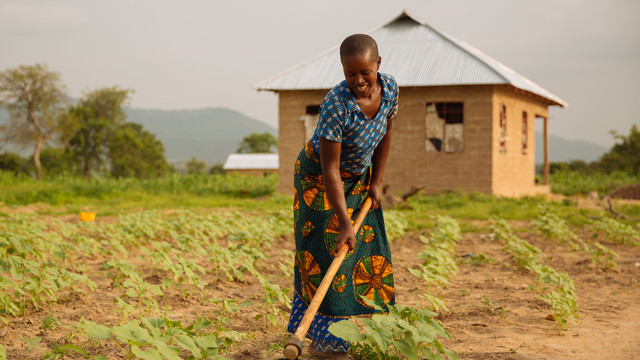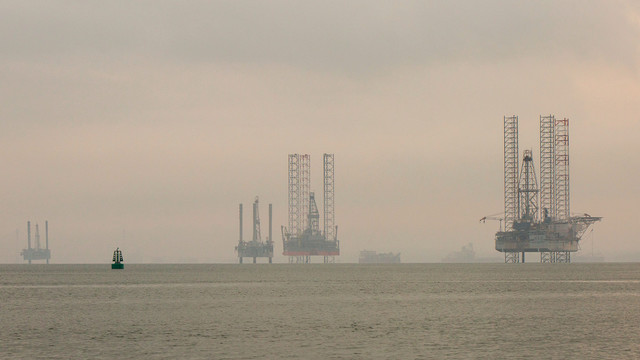'Land grabbing' in the shadow of the law in Africa
Imagine you live in a small village in Africa. You and your family cultivate a small plot of land, graze livestock on village land and collect fire wood from a nearby forest – just as your grandparents and great grandparents did. Then, one day, everything changes. A big car arrives in the village with company officials and the chief district officer. You are told that the company and the government have signed a lease that gives the company a large area of land – including your plot, rangeland and forest. The visiting officials are upbeat – there will be jobs, a village school and a clinic as result. But you have heard promises before, and you were let down. You stand to lose all that you have – the land that feeds your family and that you belong to. All for an uncertain future. You rightly ask: “Will the jobs materialise? Will I get one? Why should I give up my farm to work on somebody else’s plantation?”

Law for people and companies: different shades of grey
As the global land rush unfolds, this scenario is becoming increasingly common. What choice do people faced with similar situations have? My new book, Human Rights, Natural Resource and Investment Law in a Globalised World: Shades of Grey in the Shadow of the Law, which is out this week, shows that options for villagers are restricted by their weak legal rights.
National and international legal developments have strengthened the protection of companies against adverse action by the host government. But much less progress has been made to strengthen the rights of local people. As a result, the ‘shadow’ that the law casts on interactions between large companies and local villagers presents different shades of grey: those already benefiting from greater access to capital, expertise and influence also enjoy stronger rights.
National law varies across states, but a recurring issue in many poorer countries is that the land that local people have been using for generations, and see as theirs, is legally owned by the government. Villagers only have rights to access and use the land. These rights may be legally protected. But this protection is often weakened by the need to show that the land is being used ‘productively’, which undermines local claims to rangelands, hunting-gathering grounds, sacred sites or land reserves set aside for future generations. Private investments may be considered to be for a public purpose that enables expropriation of local rights even in the face of local opposition – an issue I blogged about two years ago.
When governments confiscate or appropriate land so that people can no longer use it, compensation may be limited to paying communities for improvements they have made to the land – for example, if they have planted trees or crops. But these payments are often low sums and in many cases no compensation is paid for the value of the land if there have been no visible improvements to it.
Requirements for companies to carry out social impact assessments and to consult with local people may be vague or poorly implemented. And only a tiny proportion of rural people in Africa have registered their land due to costly and difficult bureaucratic procedures.
This separate worldwide study, which examines 30 national land laws, concludes that people’s weak land rights under national law make them vulnerable to dispossession. This circumstance has also been widely documented by studies on specific countries, for example in Cameroon.
Universal rights but different rules
Where legal avenues under national law are limited, villagers may seek redress through international human rights law, exercising fundamental human rights like the right to food or the right to property. This is often impossible in practice, as it requires financial and technical resources that are not available to rural people. Also, before accessing international human rights courts, international law requires claimants to first try all available remedies before national courts, which may involve several degrees of appeal.
If villagers win the case, they may be left with a decision having limited legal or practical force. In Africa, claimants can bring cases to the African Commission on Human and Peoples’ Rights, which only issues non-binding decisions. The Commission may then bring the matter to the recently established African Court on Human and Peoples’ Rights. The Court issues binding and enforceable judgments. But only about half the African states are parties to the Court’s Protocol, so the Court is inaccessible for people in many countries. And even for the judgments of the African Court, enforceability against a government’s determined resistance is in practice mainly dependent on political action, rather than legal redress.
Remedies aside, the substantive protection offered by international human rights law also presents shortcomings. For example, the African Charter on Human and Peoples’ Rights affirms the right to property but does not require states to compensate right-holders for losses suffered; it merely requires compliance with applicable law. As a result, international law does not fill gaps in compensation requirements under national law. And only one African country has ratified International Labour Organisation Convention No. 169, which protects the resource rights of indigenous peoples.
This situation contrasts sharply with the legal protection that states have been prepared to accord to foreign investors. Over the past few years, a growing number of bilateral investment treaties (now over 2700 worldwide) have granted investors much stronger protection of their property rights, including through wide-ranging safeguards against expropriation, usually involving specific compensation standards, and through direct access to international arbitration as a way to settle disputes.
Many national investment codes contain similar provisions, and robust legal safeguards may be included in the contract with the host government – for example, in the form of ‘stabilisation clauses’ that require the government to compensate the investor for losses suffered as a result of changes in applicable law, as explained in this report: Land Deals in Africa: What is in the Contracts?
Where investors take a dispute with the government to international arbitrators, they usually do not have to go through national courts first, as is required under human rights law. And where arbitrators decide in favour of investors, they can award large amounts of public money in compensation. Arbitral awards – the decisions taken by arbitrators – are legally binding. Of course, in practice investment law offers no absolute sanctuary against determined host government action. But arrangements for enforcing awards have proved generally effective: where governments are unwilling to pay up, investors can seize assets that the host state holds abroad. In addition, governments are often under pressure to comply with awards in order to keep attracting investment.
Rethink on national and international regulatory frameworks needed
Investors do need effective safeguards against arbitrary and discriminatory treatment. But as global interest in African lands increases, it is imperative that local people also have stronger rights, and that mechanisms are established to promote more inclusive and sustainable investments.
For this to happen, international law must be more balanced, so that the protection it offers to investment is matched by equally strong safeguards for rights that may be affected by investment flows. National land law must be more democratic, meaning that local people must have stronger rights to their land and the right to say “no” to commercial developments affecting it. . And contractual arrangements must be more inclusive, in terms of transparency and public accountability, and in terms of safeguards for local land rights where national law falls short of international standards.
Global leaders are now discussing ways to regulate agricultural investments. For example, the African Union, the African Development Bank and the UN Economic Commission for Africa recently held a forum on this topic in Nairobi. And the UN Committee on World Food Security, meeting in Rome next week, is discussing the adoption of voluntary guidelines on the responsible governance of tenure of land, fisheries and forests in the context of national food security. It's important for decision-makers to keep their minds focused on what is needed to rethink the regulatory frameworks governing agricultural investment and its impacts. Tinkering around the edges just will not work.
Pushing the boundaries of legal rights
The challenge is not just about policy making. National and international law already offers tools that can be used more effectively. Take Mozambique’s local consultation requirement, which is enshrined in the country’s Land Law. In practice, this often means one-off meetings with local elites leading to a non-binding report – as documented by this report. But with well thought out support, this requirement can be implemented as a fully-fledged, inclusive negotiation leading to a legally enforceable contract.
Many pioneering organisations in Africa are pushing the boundaries of the law to protect local rights and to get local voices heard. They include for example:
- Centro Terra Viva in Mozambique
- The Centre for Public Interest Law in Ghana
- The Centre for Environment and Development in Cameroon
- The Groupe d’Etude et de Recherche en Sociologie et Droit Appliqué of the Bamako University Law School in Mali
- Innovation Environnement Développement – Afrique in Senegal
- and the Tanzania Natural Resource Forum in Tanzania.
Greater awareness of rights and greater capacity and confidence to exercise them can be powerful tools. After attending a legal literacy training, a Malian farmer once said: “We now know that we are also sons of this country, and that we have rights to claim”. The scale of the challenge is daunting, and this work must be supported.
Collective action and social mobilisation are critical to give real leverage to legal rights. Farmer organisations are increasingly vocal on ”land grabbing”. For example, in Mali, national farmers’ organisations held a farmers forum last year that resulted in this public appeal. It is crucial that these voices are heard.
So long as people can so easily be deprived of their land, the hopes that many have placed in a renewed interest in African agricultural investments will never be fulfilled.



